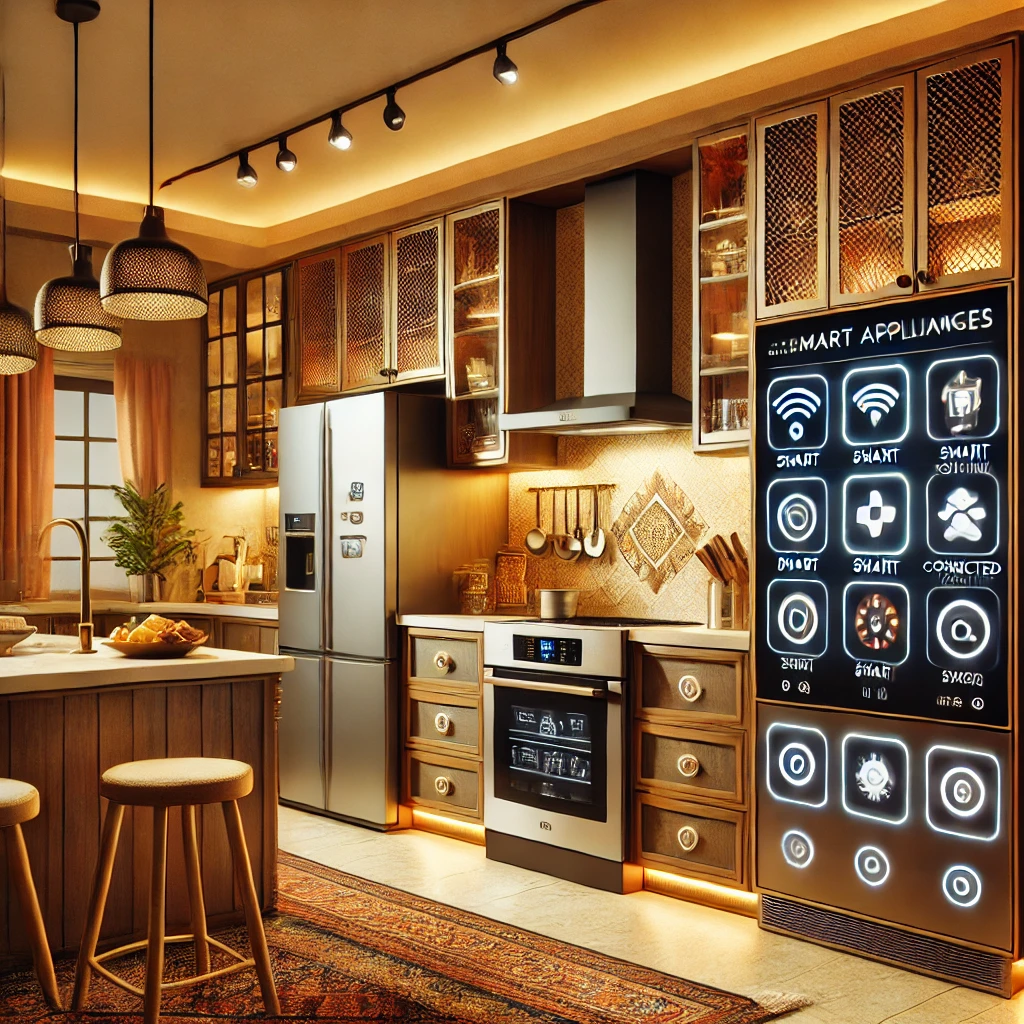
Introduction
In the ever-evolving landscape of home technology, the “smart kitchen” is emerging as a game-changer, especially in India. With busy lifestyles and a growing affinity for automation, Indian households are increasingly embracing smart kitchen gadgets and systems. This article explores the concept of a smart kitchen, its benefits, and how it can transform everyday cooking and kitchen management in Indian homes.
What is a Smart Kitchen?
A “smart kitchen” integrates advanced technology into kitchen appliances and systems, allowing for enhanced convenience, efficiency, and safety. These technologies include smart refrigerators, ovens, dishwashers, and even intelligent cooking assistants that can be controlled remotely through smartphones or voice commands. In India, where traditional cooking practices meet modern lifestyles, a smart kitchen offers the perfect blend of tradition and innovation.
Key Components of a Smart Kitchen
1. Smart Appliances
Smart appliances are the cornerstone of any smart kitchen. In India, popular choices include smart refrigerators with touchscreen displays, smart ovens that can be pre-programmed for specific recipes, and smart dishwashers that optimize water and energy usage. These appliances are designed to make cooking and kitchen management more efficient, saving both time and effort.
2. Voice-Activated Assistants
Voice-activated assistants like Amazon Alexa and Google Assistant are becoming essential in smart kitchens. In Indian homes, these devices can be used to control kitchen appliances, set timers, search for recipes, and even manage grocery lists through simple voice commands, making the cooking process smoother and more enjoyable.
3. Smart Cooking Devices
Smart cooking devices, such as multi-cookers and smart induction cooktops, are gaining popularity in India. These devices can be controlled via smartphone apps, allowing users to monitor and adjust cooking settings remotely. This is particularly useful in Indian kitchens, where diverse cooking methods are employed, from slow-cooking dals to quick stir-fries.
4. Connected Lighting and Climate Control
A smart kitchen also includes connected lighting and climate control systems. In Indian kitchens, where lighting and ventilation play crucial roles, smart lighting can adjust brightness based on the time of day or the activity being performed. Similarly, smart climate control systems can maintain optimal temperatures, ensuring a comfortable cooking environment.
Benefits of a Smart Kitchen in India
1. Enhanced Convenience
One of the primary advantages of a smart kitchen is the convenience it offers. In fast-paced Indian households, where multitasking is common, smart kitchen devices allow users to control and monitor their kitchen activities remotely. For instance, you can preheat your oven while still at work or check the contents of your refrigerator from the grocery store.
2. Energy Efficiency
Smart kitchen appliances are designed to be energy-efficient, which is a significant benefit in India, where energy costs can be high. These appliances use advanced sensors and algorithms to optimize energy consumption, reducing electricity bills and promoting a more sustainable lifestyle.
3. Safety and Security
Safety is a critical concern in any kitchen, and smart technology helps address this in multiple ways. Smart smoke detectors, gas leak sensors, and automatic shut-off features in smart ovens and cooktops can prevent accidents, making the kitchen a safer place, especially in homes with children or elderly family members.
4. Personalized Cooking Experience
Smart kitchens offer a personalized cooking experience tailored to individual preferences and dietary needs. For example, smart ovens can remember your preferred cooking settings, while recipe apps can suggest meals based on the ingredients available in your smart refrigerator. This customization is particularly beneficial in India, where culinary preferences vary widely across regions.
Challenges of Adopting Smart Kitchens in India
1. High Initial Costs
The initial investment required for setting up a smart kitchen can be high, which may be a barrier for many Indian households. However, the long-term savings in energy costs and the added convenience often justify the initial expenditure.
2. Technological Literacy
While urban areas in India are rapidly adopting smart home technologies, there is still a gap in technological literacy, particularly in rural areas. Educating consumers about the benefits and ease of use of smart kitchen devices is crucial for broader adoption.
3. Internet Connectivity
Reliable internet connectivity is essential for the seamless functioning of smart kitchens. In some parts of India, especially rural regions, internet connectivity can be inconsistent, which may hinder the effective use of smart kitchen technologies.
Future of Smart Kitchens in India
The future of smart kitchens in India looks promising as technology continues to evolve and become more accessible. With increasing urbanization, the demand for smart home solutions, including smart kitchens, is expected to grow. Innovations such as AI-powered cooking assistants and fully automated kitchen systems could soon become commonplace in Indian households.
Conclusion
The smart kitchen represents the future of home cooking in India, offering a blend of convenience, efficiency, and safety that aligns with the modern Indian lifestyle. As technology becomes more affordable and widespread, smart kitchens will likely become a standard feature in homes across the country. For Indian consumers, embracing smart kitchen technology is not just about keeping up with trends but about enhancing their quality of life.



